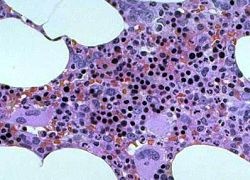Bone marrow cells given gene therapy 'shield'
Radiotherapy affects bone marrow cells, lowering production of white blood cells. New research, published in The Journal of Gene Medicine, suggests that pre-treatment with a gene therapy 'shield' could defend healthy bone marrow cells.

Using an in vitro technique, a specifically engineered, non-harmful virus was designed to infect only bone marrow cells. The virus was further modified to carry a human gene that carries information on how to make the protein superoxide dismutase 2 (SOD2) - one of the body’s defence mechanisms that clears up harmful radicals, such as those caused by radiation damage. Bone marrow cells modified by the virus produce higher levels of SOD2 than usual.
The protein appeared to provide the cells with added protection against radiation, reducing the side effects of the treatment and allowing stronger doses to be used. ‘There is still a great deal of work to be done before we can start trying it in patients,’ said researcher Dr Thomas Southgate. ‘But the prospects are potentially very exciting.’
The team, based at the Paterson Institute for Cancer Research at the University of Manchester, hopes that eventually the discovery will yield pre-treatment protection.
01.07.2006











